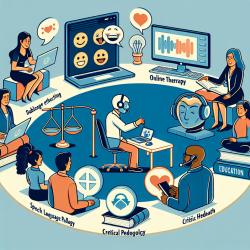Introduction
In today's rapidly evolving world, public health professionals face complex ethical challenges. The research article "Developing public health ethics learning modules – can we learn from critical pedagogy?" by Lindert and Potter (2015) offers valuable insights into how public health practitioners can enhance their skills through critical pedagogy. This blog explores the key takeaways from the research and how they can be applied to improve outcomes in the field of public health, particularly for those working with children.
The Role of Critical Pedagogy
Critical pedagogy, a concept introduced by Paulo Freire, emphasizes education as a tool for social change. It encourages students to engage in critical dialogue and analysis, shifting the learning process from teacher-centered to student-centered. This approach is particularly relevant in public health ethics, where practitioners must navigate complex moral landscapes.
Implementing Critical Pedagogy in Public Health
The research highlights several ways in which critical pedagogy can be integrated into public health ethics education:
- Student-Centered Learning: Encourage students to take an active role in their education by posing real-world problems and fostering critical thinking.
- Collective Learning: Facilitate joint decision-making and collaborative learning to build on students' existing knowledge.
- Critical Dialogue: Promote open discussions that challenge dominant myths and encourage social change.
Ethical Analysis in Public Health
Public health ethics involves evaluating different courses of action and their consequences. The research outlines three major approaches to ethical reasoning:
- Deontological Approach: Focuses on the inherent rightness or wrongness of actions, independent of their outcomes.
- Consequentialist Approach: Evaluates actions based on the consequences they produce, aiming for the greatest good for the greatest number.
- Virtue-Based Approach: Examines the characteristics of actions, emphasizing qualities like courage and wisdom.
Application in Practice
For practitioners in speech-language pathology and other public health fields, integrating these ethical frameworks can enhance decision-making and improve outcomes for children. By fostering a learning environment that encourages critical thinking and ethical reasoning, professionals can better address the unique challenges they face.
Conclusion
Developing public health ethics modules through critical pedagogy offers a powerful tool for enhancing practitioner skills. By embracing this approach, public health professionals can better navigate ethical dilemmas and contribute to positive social change. To delve deeper into this topic, consider exploring the original research paper.
To read the original research paper, please follow this link: Developing public health ethics learning modules – can we learn from critical pedagogy?










